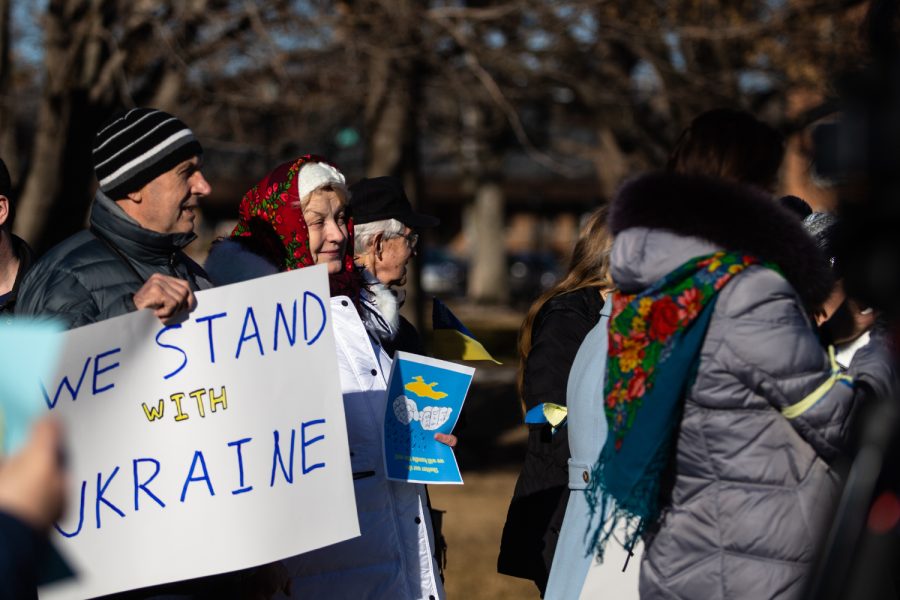Opinion | Peaceful protests are more effective
The current state of the world is characterized by conflict, but we should peacefully show our support for those affected.
Demonstrators listen to speakers during a pro-Ukraine demonstration at the Pentacrest at the University of Iowa in Iowa City. Around 80 people attended the demonstration.
March 10, 2022
The beginning of the pandemic two years ago, to some, was a time characterized by staying indoors as much as possible. To others however, it was a time characterized by human rights violations and poor governance, a time when citizens had to unite and protest for what they believed in.
I have the utmost respect for individuals who are willing to support and demonstrate for suffering people that they probably will never even meet. A recent example of this was the demonstration on the Pentacrest on Feb. 27 in Iowa City that was done in solidarity with the people of Ukraine. This is what the norm should be in terms of protesting and demonstrating.
A 2021 study of 30,000 protests over 18 months found that armed protests increased in 2021, and they were said to be six times more prone to a violent outcome than non-armed ones. This is problematic because studies show that peaceful protests are more effective at achieving protesters’ goals.
The nature of protests and its causes — usually sensitive topics like oppression, marginalization, and brutality — can make it difficult to remain peaceful and civil. Emotions, including anger, can run high, and passion for a cause can take hold in a crowd in ways that have an undesirable outcome.
Gordana Rabrenovic, director of the Brudnick Center on Violence and Conflict at Northeastern University, mentions important points that validate this. In essence, the success of protest in establishing lasting change is based on support, which can be attained through peace and consensus.
To paint the picture, if protesters used threats and violence against what they were opposing or as a means of supporting a cause, their acts would be more detrimental than beneficial as research suggests that acts of violence generally reduce public support for the protesters responsible and, by extension, the causes they protest for.
This is further burgeoned by a study that shows nonviolent campaigns lead to political change 53 percent of the time, while violent ones succeed at a much lower rate — 26 percent. Based on this information, peaceful protests are more effective than violent ones; hence, should be the norm for enacting macro-level change or debating micro-level disputes.
This is now, more than ever, relevant to consider as the world continues to disagree on hundreds of different topics every day. From the menial “pancakes vs. waffles” conversations to the more serious “pro-choice vs. pro-life” debates, it is important to acknowledge that there is a civil and effective way of creating change.
The world we live in right now is extremely volatile. Geopolitical conflicts are claiming the lives of millions of innocent people, certain groups are marginalized because of their race, and politicians continue to do the exact opposite of what their constituents want. Amid all that, amid the volatility, we must voice our concerns in a peaceful manner because it is the best way to make a difference.
Columns reflect the opinions of the authors and are not necessarily those of the Editorial Board, The Daily Iowan, or other organizations in which the author may be involved.














